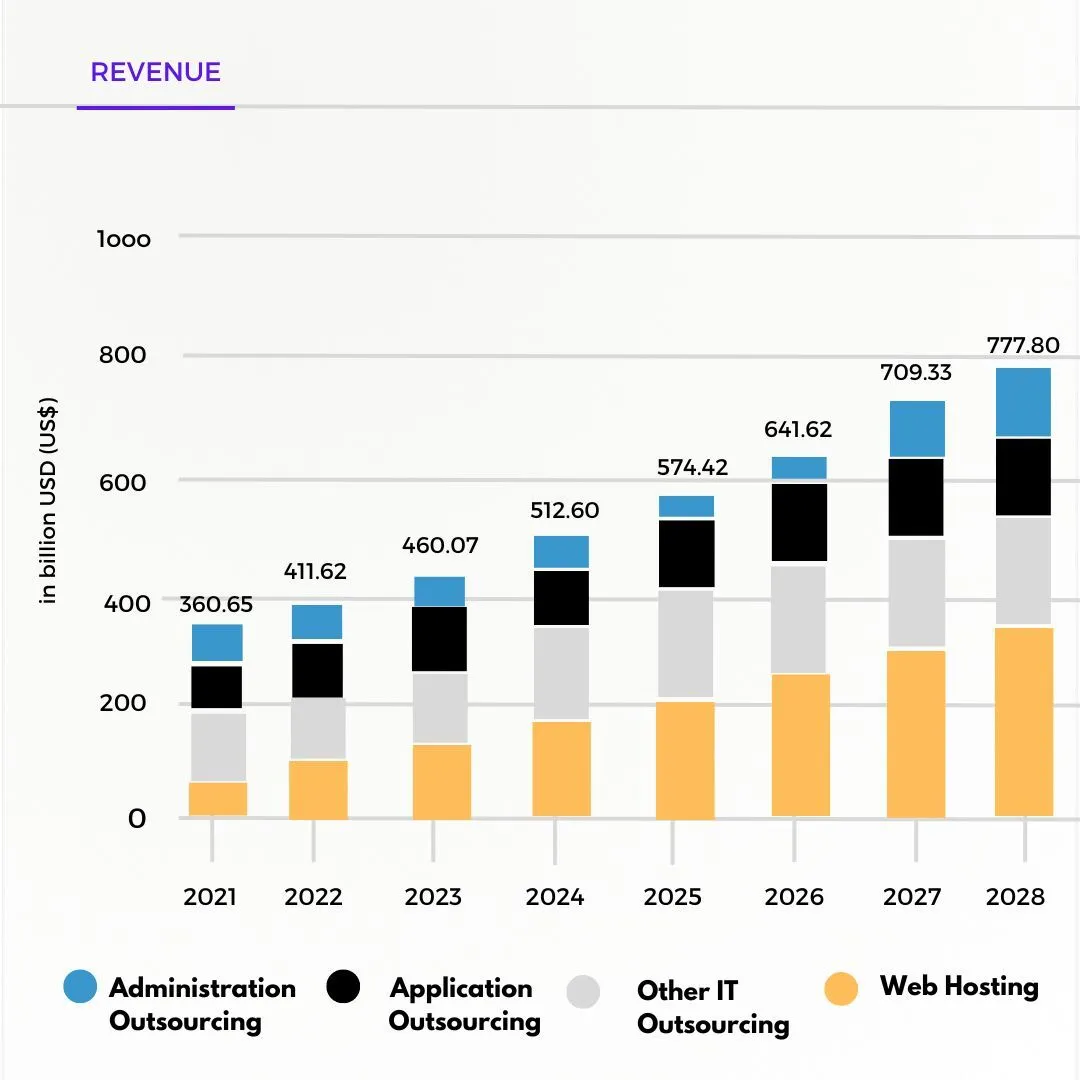- Home
- -Blog
Navigating IT Project Outsourcing: A Modern Business Lever

- 27 FEB 2024
- Admin
Navigating IT Project Outsourcing: A Modern Business Lever
Introduction to IT Project Outsourcing
Businesses continuously seek ways to stay competitive and innovative. IT project outsourcing has emerged as a pivotal strategy in this pursuit, but what exactly does it entail?
Defining IT Project Outsourcing
Simply put, IT project outsourcing involves hiring external service providers to handle specific information technology functions. These could range from software development to network management, from data storage solutions to cybersecurity measures. It's like enlisting a team of experts from outside your company to propel your tech-related tasks forward.
The Scope of Outsourcing IT Projects
Outsourcing isn't just about sending work elsewhere; it's about crafting partnerships that can lead to enhanced performance, access to cutting-edge technology, and innovative solutions. From startups to conglomerates, organizations of all sizes tap into this resource to leverage skills and services that might not be available in-house.
The significance of IT outsourcing in the economic arena is underscored by impressive statistics: the revenue in the IT Outsourcing market is projected to reach a staggering US$512.50 billion in 2024.
Furthermore, this market is not just growing; it's thriving, with an expected annual growth rate (CAGR) of 10.99% from 2025to 2028, culminating in a market volume of US$777.70 billion by 2028.(Source: IT Outsourcing - Worldwide | Statista Market Forecast ).

These figures highlight the growing reliance on and the importance of outsourcing in the IT sector, reflecting a global trend towards leveraging external expertise to drive business growth, innovation, and competitive advantage.
Why Outsource?
When we talk about IT project outsourcing, it's essential to look beyond the traditional view of simply cutting costs. Today's businesses are looking at outsourcing as a smart strategy to drive efficiency, innovation, and growth. Here's why:
-
Cost Savings and Efficiency:
- Reduced Overhead: By outsourcing, companies can save on expenses associated with hiring full-time employees, such as benefits, training, and office space.
- Scale on Demand: Organizations can adjust the level of support or services needed based on their current projects, allowing for more flexible cost management.
- Streamlined Processes: External providers often bring systems and processes that have been refined across multiple clients, leading to increased operational efficiency.
-
Access to Global Talent:
- Specialized Expertise: Outsourcing partners often have a pool of specialists with a level of expertise that may be hard to find locally or would require significant training and investment.
- Round-the-Clock Productivity: Thanks to time zone differences, work can continue outside of regular business hours, keeping projects moving forward more quickly.
- Cultural Diversification: A global team can bring new perspectives and approaches to problem-solving, which can be a hidden asset for innovation.
-
Focus on Core Business Functions:
- Shift in Priorities: Outsourcing IT tasks allows your in-house team to redirect their focus on strategic objectives that serve the core mission of the business.
- Competitive Advantage: Leveraging outsourced IT services can help businesses implement new technologies faster than competitors, giving them an edge in the market.
- Risk Management: Outsourcing companies can assume and manage much of the risk associated with IT projects, particularly as they have specific industry knowledge, especially security and compliance issues.
Outsourcing IT projects offers tangible benefits that go far beyond mere cost savings. It's about enhancing capability, agility, and ultimately, performance. Companies that recognize this can transform outsourcing into a formidable tool that supports their overall strategic vision.
Challenges of IT Project Outsourcing
While there are many potential benefits to outsourcing IT projects, there are also some challenges to consider, including:
- Communication and Cultural Differences: When working with an outsourcing partner, particularly one in a different country or time zone, communication and cultural differences can sometimes present challenges. It's important to establish clear lines of communication and to be mindful of cultural differences to ensure a successful partnership.
- Quality Control: Ensuring that the work being done by your outsourcing partner meets your standards and expectations can be a challenge. It's important to establish clear quality control processes and to regularly review the work being done to ensure it meets your requirements.
- Data Security: Protecting sensitive data is a major concern for any business, and this is especially true when outsourcing IT projects to IT companies. It's important to work with a reputable outsourcing partner and to establish clear data security protocols to ensure that your data is protected.
- Dependence on the Outsourcing Partner: Relying too heavily on an outsourcing partner can create a dependence that can be difficult to break if the relationship sours or if the partner is unable to meet your needs. It's important to maintain some level of in-house expertise and to have a plan in place in case the relationship with your outsourcing partner needs to be terminated.
Best Practices for IT Project Outsourcing
To make the most out of IT project outsourcing, it's important to follow these best practices:
- Clearly define the scope of the project and the expectations for the outsourcing partner.
- Establish clear lines of communication and regular check-ins to ensure that the project is on track.
- Implement quality control processes to ensure that the work being done meets your standards.
- Protect sensitive data by working with a reputable outsourcing partner and establishing clear data security protocols.
- Maintain some level of in-house expertise and have a plan in place in case the relationship with your outsourcing partner needs to be terminated.
The Future of IT Project Outsourcing
The landscape of IT project outsourcing is perpetually evolving, shaped by technological advancements and changing market dynamics. Here's a glimpse into the future of IT project outsourcing, underscored by emerging trends and the pivotal role of innovation.
Emerging Trends and Predictions:
-
Increased Demand for Cloud Services:
- The surge in cloud computing is expected to grow, with more businesses outsourcing their infrastructure, platforms, and software through the cloud.
- This transition will foster more flexible, scalable, and cost-effective services, accommodating the ebb and flow of business needs.
-
Rise of Automation and AI:
- Outsourcing will likely see a shift towards automation, with artificial intelligence and machine learning taking over repetitive tasks.
- This will not only streamline operations but also open up new avenues for outsourcing complex, decision-based processes.
-
Greater Focus on Core Competencies:
- Companies will continue to outsource IT functions to focus on their core competencies, driving innovation and strategic growth within their primary markets.
-
Shift Towards Value-Driven Outsourcing:
- The emphasis will transition from cost-saving to value creation, with outsourcing becoming a strategic tool for driving business transformation and competitive advantage.
-
Cybersecurity as a Top Priority:
- As data breaches become more sophisticated, outsourcing partners will be expected to provide advanced cybersecurity measures and compliance with international data protection regulations.
-
Enhanced Collaboration Models:
- The traditional client-vendor relationship will evolve into collaborative partnerships, with outsourced teams integrating more closely with in-house teams to foster innovation and knowledge sharing.
-
Remote Work and Global Talent Pools:
- The normalization of remote work will expand the talent pools available for outsourcing, enabling businesses to tap into a diverse set of skills from around the world.
Conclusion
IT project outsourcing has become a cornerstone of business strategy, driving cost efficiency and granting access to global expertise. By embracing best practices, such as clear communication and rigorous vendor selection, companies can mitigate risks and harness the full potential of outsourcing.
As we look forward, emerging technologies like AI and cloud services are set to deepen the impact of outsourcing, making it an even more integral part of business growth and innovation. In essence, successful IT project outsourcing is less about the act of delegation and more about fostering strategic partnerships that propel businesses forward in the digital landscape.



